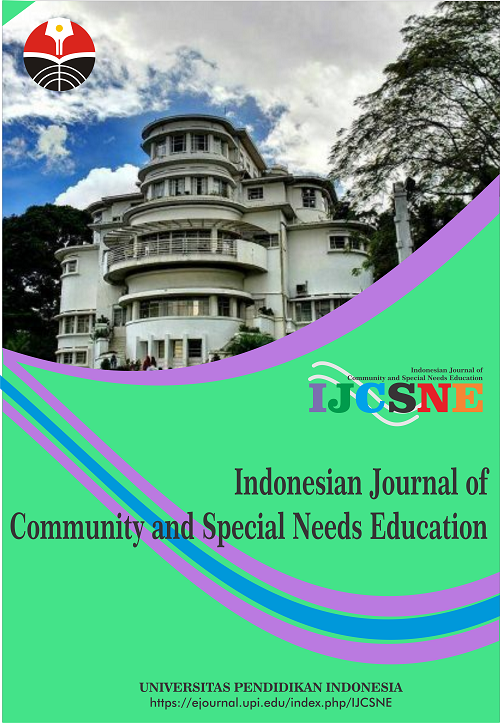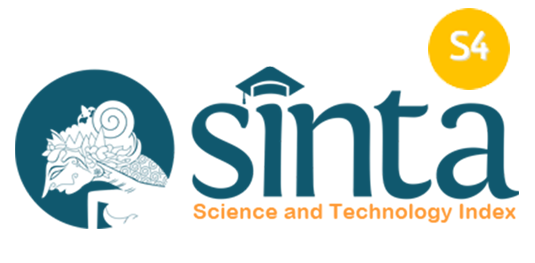Analysis of Science Education Curriculum for Students with Special Needs in Special Schools: The Curriculum of 2013
Abstract
Keywords
Full Text:
PDFReferences
Akcay, B. (2009). Problem-based learning in science education. Journal of Turkish Science Education, 6(1), 28-38.
Ardianingsih, F., Mahmudah, S., and Rianto, E. (2017). Peran guru dalam implementasi Kurikulum 2013 pendidikan khusus pada SLB di Sidoarjo. JP (Jurnal Pendidikan): Teori dan Praktik, 2(1), 21-30.
Asmariani, A. (2014). Prinsip-prinsip pengembangan kurikulum dalam perspektif islam. Al-Afkar: Jurnal Keislaman and Peradaban, 2(2), 55-85.
Fajri, K. N. (2019). Proses pengembangan kurikulum. Islamika, 1(2), 35-48.
Gerde, H. K., Schachter, R. E., and Wasik, B. A. (2013). Using the scientific method to guide learning: An integrated approach to early childhood curriculum. Early Childhood Education Journal, 41, 315-323.
Haqiqi, A. K. (2019). Telaah implementasi kurikulum 2013: Tinjauan pada rencana pelaksanaan pembelajaran (rpp) mata pelajaran ilmu pengetahuan alam. Journal of Natural Science and Integration, 2(1), 12-18.
Lase, F. (2015). Dasar pengembangan kurikulum menjadi pengalaman belajar. Jurnal Obsesi: Jurnal Pendidikan Anak Usia Dini, 1(2), 130-140.
Lestari, N. D. (2018). Analisis penerapan kurikulum 2013 dalam meningkatkan kualitas pembelajaran ekonomi di SMA Negeri Se-Kota Palembang. Jurnal Neraca: Jurnal Pendidikan Dan Ilmu Ekonomi Akuntansi, 2(1), 68-79.
Maftuhin, M., and Fuad, A. J. (2018). Pembelajaran pendidikan agama islam pada anak berkebutuhan khusus. Journal An-Nafs: Kajian Penelitian Psikologi, 3(1), 79-90.
Mansur, R. (2016). Pengembangan kurikulum pendidikan agama islam multikultural (suatu prinsip-prinsip pengembangan). Vicratina: Jurnal Ilmiah Keagamaan, 1(2), 3.
Maryanti, R. (2021). Assessment of mathematical abilities of students with intellectual disabilities during the covid-19 pandemic. Indonesian Journal of Community and Special Needs Education, 1(2), 47-52.
Mayasari, M. (2016). Implementasi kurikulum 2013 pada anak berkebutuhan khusus (ABK) di SD Muhammadiyah Sapen Yogyakarta. INKLUSI, 3(1), 1-18.
Mirnasulistyawati, M., Armelia, A., and Afdal, A. (2020). Analisis penerapan kurikulum 2013 dalam meningkatkan kualitas pembelajaran. Jurnal Mappesona, 3(1).
Munandar, A. M., and Amiruddin, A. A. (2020). Analisis penerapan kurikulum 2013 dalam meningkatkan kualitas pembelajaran kimia SMA NEGERI 3 Kota Bima. Jurnal Redoks: Jurnal Pendidikan Kimia Dan Ilmu Kimia, 3(2), 1-7.
Nurhasanah, A., Pribadi, R. A., and Nur, M. D. (2021). Analisis kurikulum 2013. Didaktik: Jurnal Ilmiah PGSD STKIP Subang, 7(2), 484-493.
Rodríguez-Dorta, M., and Borges, Á. (2017). Behavioral patterns in special education. Good teaching practices. Frontiers in Psychology, 8, 631.
Shofiyah, S. (2018). Prinsip–prinsip pengembangan kurikulum dalam upaya meningkatkan kualitas pembelajaran. EDURELIGIA: Jurnal Pendidikan Agama Islam, 2(2), 122-130.
Surasmi, W. A. (2013). Penerapan pendekatan saintifik dalam proses pembelajaran kurikulum 2013. Gospodarka Materiałowa i Logistyka, 26(4): 185-197.
Susanti, L. (2016). Implementasi kurikulum 2013 pada anak tunagrahita di SLB AC. Jurnal Pendidikan Khusus, 8(2).
Zainab, N. (2017). Prinsip-prinsip pengembangan kurikulum pendidikan agama islam perspektif islam. Jurnal Fenomena, 16(2), 366.
Zulaikhah, D., Sirojuddin, A., and Aprilianto, A. (2020). Analisis pembelajaran pendidikan agama islam kurikulum 2013 bagi anak berkebutuhan khusus. Tafkir: Interdisciplinary Journal of Islamic Education, 1(1), 54-71.
DOI: https://doi.org/10.17509/ijcsne.v3i2.56271
Refbacks
- There are currently no refbacks.
Copyright (c) 2023 Universitas Pendidikan Indonesia

This work is licensed under a Creative Commons Attribution-ShareAlike 4.0 International License.















